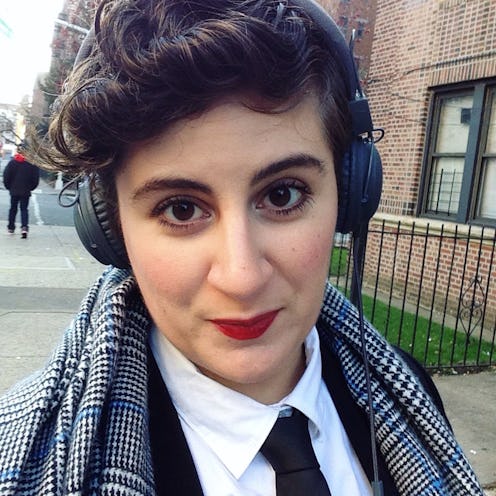Life
5 Lessons For Dating A Genderqueer Partner

If you're dating someone who identifies as genderqueer, chances are you've already aced Trans 101. You've read more than a few articles about non-binary identity and they all make sense to you. But dating someone who identifies as non-binary, gender fluid, or genderqueer can bring up some new experiences even if you identify as cisgender.
I identify as a gender-fluid ciswoman but have identified in the past as genderqueer and used neutral pronouns. Over my dating history, I've paired up with folks across the gender spectrum: cisgender lesbian femmes, straight identified cismen, masculine of center genderqueer folks, crossdressing cismen, and others, many of whom weren't familiar with gender fluid identity. Between navigating my own identity and my partners', I think a lot about how sex and dating affect our gender expression and identity. I've found especially when I talk about my dating experiences with non-queer friends, I notice that they can be tripped up by the way mine and my partner's identities influence our relationship.
Now, I am with a partner whose gender expression also varies, and we love engaging in gender play as a part of our dynamic. Between all of these experiences, I've observed a few key insights about both being a genderqueer partner to a cisperson and being with gender fluid partners.
1. Our language relies heavily on gendered terminology.
Maybe you already notice how often you get called “you guys” or “ladies” but when you’re dating someone who doesn’t fit neatly into either category, you might start hearing these phrases differently. Encourage your friends to adopt “y’all” or “you two” or another neutral term when referring to you and your squeeze. As for interactions with strangers, like wait staff or people you just met, in my experience it’s best to ask your partner how they prefer to deal with those situations.
Another situation where you’ll run into this: what to call your boo when you decide you’re together. Luckily there are lots of alternatives to boyfriend/girlfriend that you are already familiar with: “bae,” “boo,” and “partner” to name a couple. Another few I really like are: “S.O.” (significant other), “squeeze,” “sweetie,” and simply “my person.”
2. Neutral pronouns will likely trip up your non-LGBTQ friends who haven’t used them before.
Of course you know to ask your date's PGPs (Preferred Gender Pronouns) from the outset. Here's a handy guide if you need a refresher. But if your date uses neutral pronouns, you might find that when you talk about them to non-queer friends, your pals may not understand the singular use of “they” as a gender-neutral pronoun option. They could also misgender your date, but it’s your job to affirm your date’s pronoun choice, whatever it is.
One way to breach this when introducing your sweetie is to say, “This is my date Jay. They work at a nonprofit. Maria, doesn’t your partner work at a nonprofit too?” Using your date’s pronouns in a sentence is the easiest and most gentle way to help others know how to refer to them.
3. Gender and sexuality aren’t the same, but are related.
This may sound like Queer Feminism 101, but it’s worth repeating. While someone may identify as genderfluid, they can have sexual preferences just like anyone else. Some fluid folks are into other fluid folks, some have lots of sexual experience, and others don’t. Some genderqueer identified folks are interested in sexy gender play, i.e. role playing, which can be really fun if you are into it. The added layer of gender play to an already steamy relationship can bring you two even closer if you share that interest.
4. Body parts sometimes require re-naming depending on identity.
While you’re exploring the intersection of your partner’s fluid identity and your sexual connection, it’s important you talk about their preferred words for their body parts and the things they like done to them. After all, it's just as critical to be body positive as it is inclusive of non-binary folks. If ever you’re not sure how to phrase something, try making things generic, like saying, “I really want to go down on you,” or “I want to feel you,” rather than using gendered terms. Tell them how much you love touching/tasting their “bits” or “junk.” This is especially relevant for those first steamy text messages.
5. Even cisgender people can benefit from loosening/abandoning gender norms and expectations.
We are all multi-layered creatures with our own unique dating and sexual histories. Wouldn’t it be better to start a relationship without any assumptions about how many partners or what kind of sex you prefer but to discover those things with someone new as you get to know them? I encourage all folks who are out in the dating world to be open and do their best not to assume, but to listen and learn from their new loves.
If your goal is an egalitarian, feminist relationship, taking a few cues from genderqueer folks, even if you don’t identify that way, can be a great thing.
Image: NC Eakin/TumblrImages: Giphy (5)